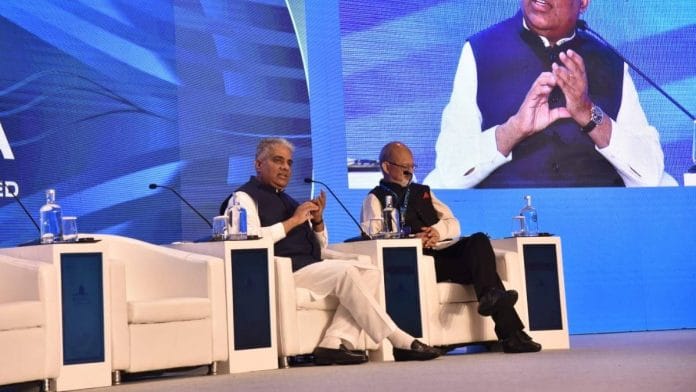New Delhi: Union Environment Minister Bhupender Yadav said Wednesday that high-income countries must deliver on their climate finance promises so that developing countries like India can achieve their climate goals.
Climate finance refers to funds that will support actions addressing climate mitigation and adaptation in developing countries.
While climate mitigation actions include those aimed at reducing or removing greenhouse gas emissions from the atmosphere — like carbon capture and storage, or investment in solar energy — climate adaptation refers to coping with the existing effects of climate change, like investing in early-warning systems.
Yadav was speaking at the seventh edition of the Raisina Dialogue, a conference on global affairs organised by the Observer Research Foundation with the Ministry of External Affairs.
“A major demand of developing countries has to do with climate adaptation. Climate finance for adaptation is only 25 per cent,” Yadav said. “It was the pledge of developed countries in Copenhagen to provide $100 billion to developing countries. But they are unable to fulfil their own promise.”
In 2009, developed countries had promised to deliver $100 billion in climate finance by 2020, but a Climate Delivery Plan, released at the COP26 last year, suggested they wouldn’t be able to do so before 2023. Most of the climate finance that has been raised and delivered has gone towards mitigation efforts, reports show.
Yadav said Wednesday that high-income countries also needed to share and transfer their climate-mitigation technologies, saying it was not being done “in a way that is required”. However, asked later which technologies he was referring to, Yadav didn’t respond.
“At Glasgow, our Prime Minister had said even $100 billion is not sufficient. In today’s world, we require $1 trillion from developed countries as climate finance,” Yadav said, echoing Prime Minister Narendra Modi’s statement at the COP26.
A standing committee of the United Nations Framework Convention on Climate Change (UNFCCC) had said countries would need between $5.8 trillion and 5.9 trillion by 2030 to meet 40 per cent of their climate goals under the Paris Agreement.
Also Read: Gen Z is at the forefront of sustainable fashion movement. Brands are adopting changes too
India’s climate goals
At the COP26, Modi announced that India would, by 2030, increase non-fossil-fuel energy capacity to 500 gigawatts (GW), fulfil 50 per cent of its energy requirements from renewable sources, reduce the carbon intensity of economy by 45 per cent, and reduce the total projected carbon emissions by 1 billion tonnes.
Carbon intensity measures the carbon dioxide emissions of different sectors of an economy.
He also promised India would achieve net-zero emissions by 2070.
These promises — called Nationally Determined Contributions (NDCs) — marked a step up from what was pledged in 2015 as part of the Paris Agreement. At the Raisina Dialogue, Yadav said India is one of the few countries “on track” to achieving its targets.
“But even after the COP26, there are some countries that say there is no need for them to enhance their NDCs. This is serious,” he said. Countries like Australia and China have not made any announcements to enhance their climate goals.
Although India has announced its new promises, it is yet to make a formal submission of its enhanced NDCs to the UN. Yadav told ThePrint in an earlier interaction that India would finalise its goals after inter-ministerial discussions, which are ongoing.
(Edited by Uttara Ramaswamy)
Also Read: Govts must act within decade to mitigate extreme climate change impact, says latest IPCC report






